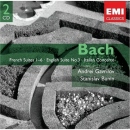|
|
French Suites BWV 812-817
Bach's French Suites, Part 1
Recordings
|
1 |
Bach: French Suites BWV 812-817 [K-5] |

|
|
French Suites BWV 812-817 [14:05, 15:09, 15:21, 14:05, 18:06, 15:56] |
|
Edward Aldwell (Piano) |
|
Hänssler |
Jun 1997 |
2-CD / TT: 92:42 |
|
Recorded at American Academy of Arts and Letters, New York, NY, USA.
Buy this album at: Amazon.com |
|
2 |
J.S. Bach: 6 French Suites BWV 812-817 [K-11] |

|
|
French Suites BWV 812-817 [12:26, 14:40, 13:38, 11:58, 16:29, 15:26] |
|
András Schiff (Piano) |
|
Decca |
Jan 1991 |
2-CD / TT: 128:47 |
|
Recorded at Reitstadel, Neumarkt.
Buy this album at: Amazon.com |
|
3 |
Bach: French Suites · Little Preludes [K-3] |

|
|
French Suites BWV 812-817 [15:15, 15:58, 15:45, 17:42, 17:46, 15:13] |
|
Angela Hewitt (Piano) |
|
Hyperion |
Jun, Aug 1995 |
2-CD / TT: 150:04 |
|
Buy this album at: Amazon.com |
|
4 |
J.S. Bach: French Suites 1-6 · English Suite No. 3 · Italian Concerto [K-1] |
 |
|
French Suites BWV 812-817 [13:57, 12:49, 17:25, 14:32, 18:20, 17:15] |
|
Andrei Gavrilov (Piano) |
|
EMI Classics |
Apr 1984 |
2-CD / TT: 125:48 |
|
Recorded at Slovak Philharmony, Bratislava, Czech Republic.
1st recording of French Suites BWV 812-817 by A. Gavrilov.
Buy this album at:
2-CD: Amazon.com |
 |
|
6 |
J.S. Bach: The French Suites [K-4] |

|
|
French Suites BWV 812-817 [17:02, 14:50, 16:58, 15:10, 19:54, 16:48] |
|
Keith Jarrett (Harpsichord) |
|
ECM |
Sep 1991 |
2-CD / TT: 100:42 |
|
Recorded at Cavelight Studio, NJ, USA.
Buy this album at: Amazon.com | Amazon.com |
|
6 |
J.S. Bach: The French Suites |

|
|
French Suites BWV 812-817 [17:02, 14:50, 16:58, 15:10, 19:54, 16:48] |
|
Keith Jarrett (Harpsichord) |
|
ECM |
Sep 1991 |
2-CD / TT: 100:42 |
|
Recorded at Cavelight Studio, NJ, USA.
Buy this album at: Amazon.com | Amazon.com |
|
7 |
J.S. Bach: French Suites [K-2] |
 |
|
French Suites BWV 812-817 [17:38, 16:33, 16:41, 19:41, 19:38, 18:17] |
|
Davitt Moroney (Harpsichord) |
|
Virgin Classics |
May 1990 |
2-CD / TT: 144:09 |
|
Recorded at Château de Creulllet, Creully, Normandy, France.
Buy this album at: Amazon.com | Amazon.com |
|
Bach's French Suites, Part 1 |
|
Donald Satz wrote (July 15, 2000):
Just having obtained Edward Aldwell's piano recording on Hänssler of Bach's French Suites, I searched through my inventory and came up with six other sets. Here's the list:
Edward Aldwell (Piano) - Hänssler 92114 (1999).
András Schiff (Piano) - Decca 433313 (1993).
Angela Hewitt (Piano) - Hyperion 67121 (1995).
Andrei Gavrilov (Piano) - EMI 49293 (1985).
Christopher Hogwood (Harp.) - Decca 411811 (1984).
Keith Jarrett (Harp.) - ECM 20001(1993).
Davitt Moroney (Harp.) - Virgin 91201(1991).
To my knowledge, they are all available, although Gavrilov and Moroney are now at reduced price with different catalog numbers. Prior to this survey, my strongest affection was for the Hogwood set, but I've never compared it directly to any other recordings.
The French Suites were written by Bach in Cothen. Thre is some debate concerning how "French" these suites are. One side notes the lack of any preludes or overtures, states that Bach never named them as the "French" Suites, and assumes that they later got that name to differentiate them from the English Suites. Others such as Moroney consider them French to the core. I tend to side with Moroney; format might not be strongly French but the musical style is. The first three French Suites are in minor keys, the other three in major keys. The minor key suites are relatively severe and/or reflective, the major key ones more exuberant.
French Suite in D minor BWV 812 - All the French Suites begin with a generous Allemande (German Dance). The D minor is bitter/sweet and reflective music of great beauty. The versions have a healthy variation among them of tempos, and the music easily accomodates the full spectrum. Each performance is excellent, and my preferences are largely based on an angular vs. seamless approach. For this music, I prefer a seamless performance; I feel it gives the piece a more enjoyable flow. The seamless versions are Jarrett, Gavrilov, and Aldwell. That's not surprising since each of them is well noted (in my mind) for this quality of playing. Gavrilov is very fast, tender, dream-like, and hypnotic. Jarrett is highly reflective with superb pacing. Aldwell is haunting and gorgeous. The remaining versions should not be dismissed. If you prefer the Allemande in an angular manner, any one of them will likely satisfy.
Next is a highly French-style Courante which is energetic and entertaining. This music, to be presented well, needs energy, strong accenting and projection of ornamentation, and a fair degree of angularity. Playing it smoothly and laid-back kills any impact. That's just what Aldwell does; he sounds disinterested and ordinary, ornamentation is weak as is accenting. Jarrett is relatively seamless and it hurts the music - so much of it sounds the same. Moroney, Hewitt, Hogwood, and Schiff get it right. Gavrilov does better than get it right. He doesn't surrrender his seamless ways but also is superb with accenting, projection, and angularity. His a performance which provides everything I could want from this Courante, and I'll consider it "perfect" until something even better comes around.
The Sarabande has an opening melody of great yearning which switches in the second half to the bass and is given a new harmony. The music is grave and severe but also needs to desplay the longing and sadness inherent in the piece. If you think of a person in depression and the feelings that come with it, you've got a good idea of the heart of the music. There's also an element of energy being slowly sucked out by the depression, leaving the victim unable to act. The speeds of the versions range from under three minutes (Schiff) to well over four minutes (Gavrilov). Describing the music as I have, it would not be unreasonable to assume that faster speeds might damage the music's depth. That appears to be the case with Aldwell whose relatively fast speed drains the music of some of its meaning. Yet, turn to the even faster version of Schiff's and he delivers all the elements missing in Aldwell's performance.
In addition to Aldwell not doing so well, the three harpsichord versions join his company. To a large degree, it's just the nature of the harpsichord, but all three sound too busy. Depression and being busy don't match up well; I get no feeling of energy being drained. Joining Schiff on the top rung are Hewitt and Gavrilov who are slow and slower. This pacing works wonderfully and their accenting is strong so that interest never wanes.
Menuet I and II follow. This is one of the most stunning menuets I know of. It easily elicits from me a host of emotions, and the melodies are gorgeous. Also, I think it's a perfect fit for the harpsichord with its "tangy" quality. Moroney takes no advantage of this and throws in some problems; he slows down periodically in Menuet I, damaging the music's flow, then he sounds too fast in II, a situation he set himself up for in I. Three piano versions (Schiff, Hewitt, Aldwell) do not overcome their disadvantage: Schiff is choppy then smooth and seems to not be of one mind concerning his conception of the music. Aldwell continues to provide readings which are too smooth, and Hewitt is altogether too cute and her ornamentations are fussy.
Jarrett delivers an excellent Menuet I and a restrained and lovely II (the best II of the group). Gavrilov engages in some high drama in II which works well, but his I is really fantastic with a mystery and urgency to die for. Hogwood provides an equally superb Menuet I with "hope" written all over it; his II isn't as good because of lack of variety in dynamics and ornamentation. These three performances are very rewarding.
A lively but very severe Gigue concludes the D minor Suite. The piece is in 4/4 time and has a highly angular and jerky rhythm with dotted trills similar to a French Overture. It's basically a fugue whre the theme of the first half is turned on its head in the second half. But it's the severity that's on my mind. Such severe music hardly needs an extra boost from the performer, but Moroney does just that with a slow pace that made the Gugue seem to last much longer than real time. I knew I didn't think well of the interpretation when I glanced at the display on my cd player to see if it was close to over and saw that only one minute had elapsed. The remaining versions are good; Schiff, the fastest of the group, comes closest to making the piece sound like dance music.
Gavrilov is the undisputed champion for BWV 812. He is excellent throughout the work, always adjusting to the needs of the music. Jarrett, Hogwood, Schiff, and Hewitt have much to offer. Aldwell unfortunately has problems serving the music instead of his desire to be smooth and a little laid-back. I hope this doesn't continue throught his set; most of the music of the French Suites does not cry out for a seamless and restrained reading. Although Aldwell has some problems, Moroney is sinking fast. He is bringing little "life" to his performances. Words like "stodgy" and "strict" and "severe" are sometimes assigned to folks like Gilbert and Hogwood. But they can't hold a candle in that department compared to Moroney. And I sincerely hope I end up eating these words as the survey progresses. |
| |
|
Continue on Part 2 |
|
|
|